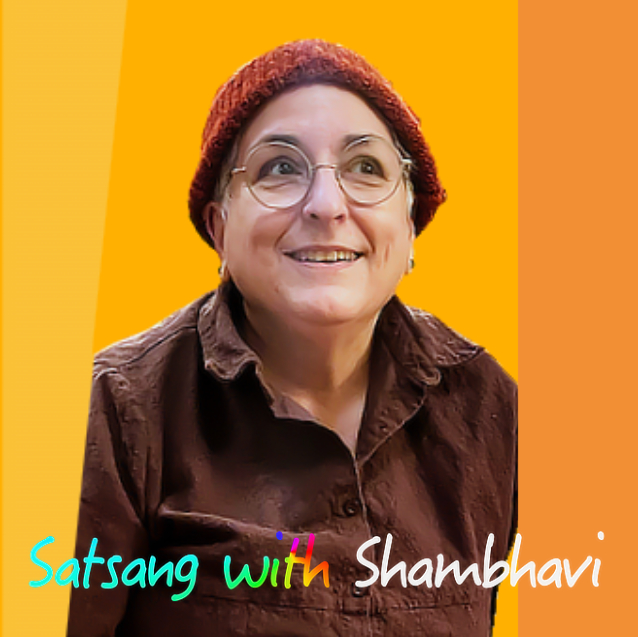Equality is Jaya Kula’s theme for 2022. In this episode, Shambhavi explores the meanings of equality for Trika Shaivism and talks about how it is connected to worship, our 2021 theme. A podcast from Satsang with Shambhavi
SHAMBHAVI
Hi everybody. So I wanted to start with something from the Tantraloka, which is Abhinavagupta’s large treatise on everything Trika Shaivism, everything about the View and a lot about practice, also.
This is from chapter four of the Tantraloka, and it relates to the shift that we are going to experience from this year to next year, because each year I give a theme that we try to investigate, and learn about, and embody, and practice with. And so this year's theme was worship, and next year's theme is equality.
Equality is one way of defining self realization—that you experience all phenomenon as being equal. And I'm going to be talking about that a lot during the retreat, and we're going to be kind of building up to that—an understanding of that through oral teachings and transmission.
Equality has a lot to do with integration, meaning that we are integrating our practice with everyday life.
One of the forms of equality that we realize—or one of the ways of talking about it—is that everyday life and our everyday activities are no different than when we do puja, or we sit and do formal practice, or we come to satsang. That all things that we do can all be sadhana, can all be worship. All have a basic equality because these circumstances are all arising from the same Self.
So this is a quote where Abhvinavagupta’s talking about the relationship between worship and integration, which I think is a bridge that we can use to move from this year to next year. He says, “Worship, or puja, in the highest sense is the process of uniting the diverse flux of phenomena with Bhairava’s independent, stainless, and infinite consciousness.”
So I'm going to talk about this a little bit right now. Worship or puja—the offering of Self to Self—is the process of uniting the diverse flux of phenomena. So that just means everything that ever is and […] happens. It means impermanence. It means the ever changing circumstances that we find [ourselves] in.
So uniting all of our everyday circumstances and every circumstance that happens—disasters and wonderful things, everything—with Bhairava’s independent, stainless, and infinite consciousness. So Bhairava is just another name for Lord Shiva, and it's generally a fierce form of Lord Shiva.
When we integrate, or when we are able to unite everything that we're experiencing and experience it as an aspect of this infinite Self—this Self we call Bhairava, or Lord Shiva, or consciousness and energy—that is worship. And this is a little, subtle point and it's not 100% easy to understand.
So we do sadhana, and that sadhana leads us to directly perceive the presence, the livingness, of everything—the awareness of everything. When we directly perceive that, and we are living our lives with that direct understanding, that felt understanding that everything is imbued with and arises from consciousness and energy—how does that relate to worship?
It relates to worship because the perception of the Self, the perception of living presence, when we have a very strong perception of it—that is absolutely simultaneous with an experience of devotion.
So we use words like consciousness and energy, or Shiva and Shakti, or whatever words we use—the Self, living presence. And all of these words—for people who don't have a very strong experience of presence—all of these words are actually a bit of a problem for us because they obscure the real nature of that.
If you just hear words like consciousness, or Bhairava, or the Self, or living presence, you have some intellectual, conceptual understanding of what that might mean. Or you can kind of take a guess up about it, right? And then you have your own experience of that living presence, of Bhairava through your sadhana.
But for most people you're not sure about it. Or it comes and goes, or it's fleeting, or it's mild. You're sort of having what's called mild shaktipat, right?
And so you haven't yet moved into a deeper, more profound, thorough encounter with this. So you haven't yet realized that that full encounter is absolutely equal to entering into the state of devotion and worshipfulness. It just happens because of the nature of the Self.
That— It's like if you see the Grand Canyon, you can't help but feel awe, right? Because there's something in the nature of that perception, that experience—you feel awe, right?
When someone you love loves you back, you can't help but feel certain things. You're not deciding to feel them. It's not a logical process. There's just certain circumstances that elicit feelings from us, right?
Or even if you watch a movie and there's some sort of suspenseful scene, we feel a little scared. Right? It's not like we're deciding to feel that, we're not looking for it. We're not like—Oh, I wonder where the fear is. [laughs]
It just happens. There's a call and response relationship between our body, energy, and mind, and circumstances.
So it's the same when we perceive living presence, or when we perceive Bhairava, or when we perceive that Supreme Self. There is an immediate, simultaneous, unavoidable experience of devotion and worshipfulness.
So this is why Abhinavagupta says, “When we unite." It would really be better to say when they appear as united—right?—because we're not really doing anything. They're always united. We're just doing our sadhana, and then it's like—Boop, okay, wait, I just got that!
But he says, “When we unite the flux of circumstance with that Supreme Self, that is worship.”
It doesn't mean anything intellectual, or like we're suddenly going to be doing puja because it seems like a good idea. He means that experience, in and of itself, that perception and immersion in that Self in the course of everyday life—and seeing that everything is that—is giving rise, simultaneously, to worship.
And now we have the experience that everything that we're doing is an offering. And it has the possibility of being filled with this natural devotion—not anything made up, not something that we thought was a good idea, not something we're looking for.
It's interesting, you know, reading this now, because no one told me this when I was studying at your stage. No one gave me any teachings like this about the nature of the Self, of reality, being this wisdom imbued with worshipfulness and devotion. This is something that Ma gave me, directly.
And there are, of course, teachings in especially Buddhist Dzogchen type texts about the ultimate nature of things being wisdom. But even then, if you read that word and you just don't have this deeper experience, even then it becomes rather clinical.
You know—Oh, it's wisdom. Okay, that sounds good. I don't know.—Right?
But the more we go into this encounter, the more this natural feeling of devotion arises. And that devotion is the devotion of the Self for its own Self.
Because just like the Grand Canyon, there's something wonderful and awesome about this reality. And when we see that directly for ourselves we have the same feeling of devotion and worshipfulness that Lord Shiva has for his own Self.
So it's no longer a sense of I am worshiping God—although that can be there also. It's more of a sense of there is devotion here, it's like everywhere. It's just happening, and now I'm swept up in it.
So this is what is the real fruit of the practice—is entering into this. When we perceive the equality of all phenomena, that everything is an aspect of this Self, that this worshipfulness arises and everything becomes wonderful like worship.
Just like actual, natural, real worship. When we no longer have any doubt.
We no longer feel—Am I just going through the motions? Does this really mean anything to me?
All these thoughts that people have, right? You no longer have any thoughts about it. The argument is over. So this is the real fruit of recognizing the equality of all phenomenon, of equality.
We're going to talk at the retreat, and hopefully have some experiences of that, and all the different ways in which equality can show up, and what integration is really all about.
And then we'll have a real— that worshipfulness is carried through into 2022. Worship was the theme for 2021, but it's carried through, because as soon as we start talking about integration and equality, we are also talking about worship and devotion. There is no leaving that behind—Okay, we did that last year! [laughs]
Now we do it all the time.
Sign up to receive email updates
Enter your name and email address below and I'll send you periodic updates about the podcast.
Read More About Trika Shaivism & Dzogchen


